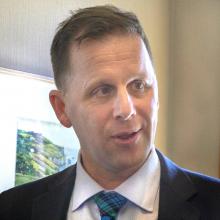As the country moves towards a future living with Covid-19, Southerners can look to their overseas counterparts for clues as to how best to navigate life with the virus. Courtney White catches up with some expats entering a world of living ‘‘Covid-normal’’ daily lives.

The mother of two works in the arts industry, which she said had been hit hard by lockdowns.
Neither she, nor anyone she knew in Australia, had contracted the virus.
She was ‘‘cautiously optimistic’’ about the future as the city’s restrictions were being lifted.
‘‘Everybody’s being pretty cautious with masks and vaccinations and things, just to protect vulnerable people.’’
People around Ms Walsh were looking forward to summer and to getting back to something closer to normal life, she said.
For now, Covid-normal was a mixed bag.
People were being encouraged to work from home if they were able to, but fully vaccinated people were able to work from the office if they could not reasonably work from home.
Her advice to people back home would be to trust that people in positions of power were doing the right thing by them.
‘‘Take it one day at a time.
‘‘If you try to guess what’s going to happen, you’ll probably be disappointed. It is hard, but there’s a real feeling of community when you get back out and about.’’
First and foremost, she said, ‘‘stay compassionate’’.
Being allowed to live more or less free with Covid-19 existing in the community feels like things are getting better, but there is always a nagging worry, Richard McKinlay says.

An occupational therapist for the National Health Service, Mr McKinlay contracted Covid-19 early in the pandemic.
His experience had been relatively minor, but he knew several people who had had severe symptoms.
The simple acts of going to the pub to see friends or going out to visit family were a relief, he said.
‘‘There’s that balance. It feels like things are improving, but there is a nagging worry that things could get worse over winter.’’
There were still some protections being promoted — the UK Government suggested mask use on public transport, but it was not mandated.
‘‘People are still wary, but there’s a natural desire to be with people again, to be in crowds again, so it feels like we’re at that point.’’
As a New Zealander, Mr McKinlay said he was proud of the way New Zealand had handled the pandemic.
Oamaru-born Matt Brien left New Zealand to play basketball for the University of Nebraska Kearney in the middle of 2019, before the pandemic began.
In that time, he has seen riots, protests, the controversial United States presidential election and the rampant spread of Covid-19, which he contracted this time last year.

He was not alone — every person in his friend group caught the virus during 2020.
Despite the ongoing prevalence of Covid-19, Mr Brien said he was happy to return to the US after visiting New Zealand last year.
‘‘In New Zealand it feels like people think Covid-19 is like cancer, really serious, like it’s the end of the world, but in America it’s quite relaxed, it’s almost like life is back to normal.
‘‘In America there doesn’t seem to be such a stigma or fear around it,’’ he said.
‘‘You can go and watch games, live events. In New Zealand there’s this fear that it could all get shut down in a second. It’s not like that here.’’
Snap lockdowns were no longer an option in Nebraska, he said.
‘‘Even when they tried to mandate masks in class, no-one listened. It lasted about two weeks and they just got rid of it.’’
His advice to New Zealanders was not to let the fear of contracting Covid-19 control their lives.
‘‘It can make you paranoid. It can be stressful when everyone’s thinking about it all the time.’’
Last month’s decision to move from a focus on eliminating Covid-19 to suppressing it essentially means New Zealanders will begin to live with the virus as a part of daily life.
University of Otago epidemiologist Prof Michael Baker said accepting endemic Covid-19 would mean the disease would remain circulating in the population, likely causing periodic but more or less predictable outbreaks over time.
What had not changed was that vaccination remained the critical defence against Covid-19.
‘‘All New Zealanders are likely to encounter this virus over the next few months as the country transitions from pandemic to endemic infection,’’ Prof Baker said.
‘‘You do not want to meet this virus if you are not vaccinated.’’
Interestingly, although New Zealand had had among the fewest lockdowns of any country in the OECD, it had also had 2000 fewer deaths overall than expected, based on modelling.
That was likely due to the strictness of lockdowns, social distancing, mask use and stringent hygiene regimens, he said.
Covid-19 would likely not become endemic in the same way influenza had, Prof Baker said.
Influenza was seasonal, in that it is more prevalent in winter, because it thrived on indoor infection, when people were at close quarters.
Covid-19, being far more infectious, might not become seasonal, though it was likely that cases would peak in winter, he said.
People might require masks indoors and on public transport for an extended period, or those rules could become obsolete.
If high levels of vaccination were achieved, it was possible there might be periods of zero cases, he said.
Simply, no-one knew yet what a future with endemic Covid-19 might look like.
‘‘For New Zealand, this can feel a bit frightening as it is new.
‘‘Elimination was easier, as it was an absolute.
‘‘We shouldn’t be dreading this virus, but we do need conversations about what it is that we are transitioning to. Knowledge is power.’’
Though no countries had yet reached the fully endemic stage, some were further ahead in their journey towards living with the virus than Aotearoa.
Arguably, Prof Baker said, New Zealand’s approach had allowed people to start the shift to living with the virus on their own terms, learning from others and adapting as necessary.












